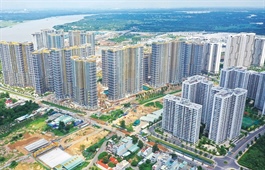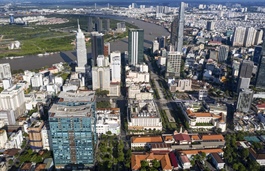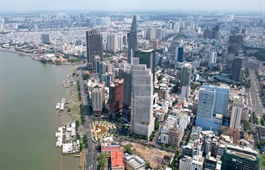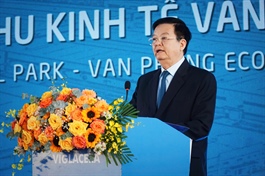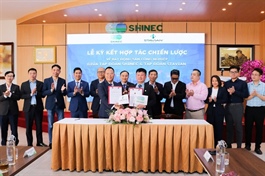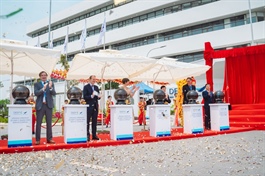Deep C drives shift toward smart, sustainable industrial parks
Deep C drives shift toward smart, sustainable industrial parks
Deep C’s industrial parks are located in strategic logistics hubs in Hải Phòng City and Quảng Ninh Province, two northern localities positioned at the crossroads of major sea, land and rail routes.
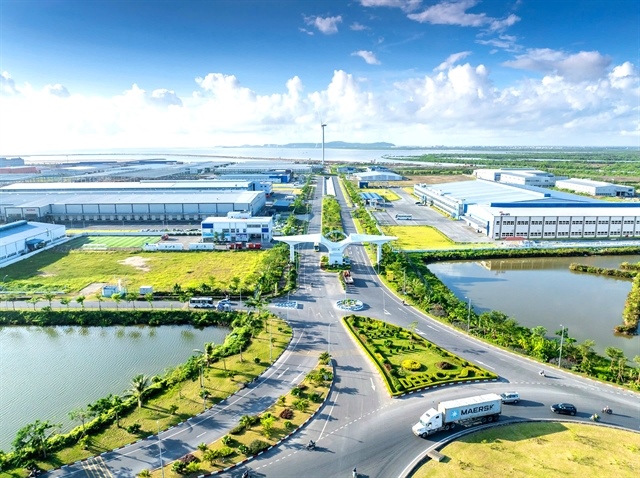
A view of Deep C Haiphong II Industrial Zone in South Đình Vũ Peninsula in northrn port city of Hải Phòng. For Deep C, the cornerstone of its success starts with something simple - location. Photo courtesy of the firm |
As Việt Nam accelerates its journey toward becoming a regional industrial powerhouse, the challenge is no longer just about attracting investment - it’s about building smarter, more sustainable, and people-centric ecosystems, where both industry and communities can thrive.
This shift reflects a global trend. Multinational companies are no longer content with merely low-cost production bases. They seek stable, efficient and future-ready environments where technology, sustainability and livability converge. For Việt Nam, which currently hosts more than 400 industrial parks, the competition is fierce - not only globally, but also domestically.
Amid this landscape, Deep C Industrial Zones has emerged as one of the pioneers pushing the boundaries of what industrial development can - and should - look like.
“Smart in the development of an industrial park is not just about technology. It’s about people,” said Koen Sonens, General Sales and Marketing Director of Deep C.
“We talk a lot about land and power and water and concrete, but behind all these investments are people. And that is the real key to sustainable development.”
For Deep C, the cornerstone of its success starts with something simple - location.
“When I joined the company almost six years ago, the first thing we told investors was that there are three things that matter: location, location and location,” Sonen said.
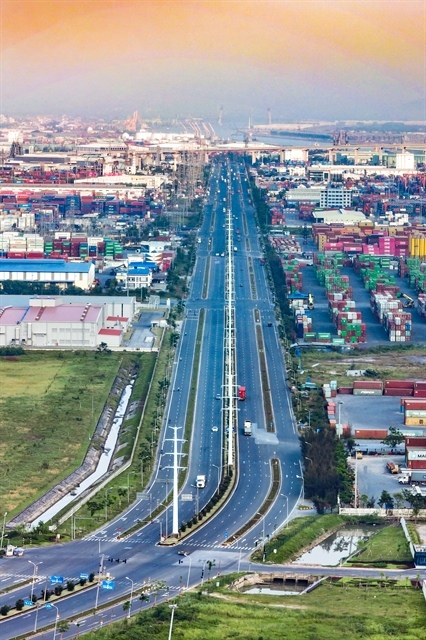
A view of Deep C Haiphong II Industrial Zone in South Đình Vũ Peninsula in northrn port city of Hải Phòng. For Deep C, the cornerstone of its success starts with something simple - location. Photo courtesy of the firm |
This isn’t just a cliché. Deep C’s industrial parks are located in strategic logistics hubs in Hải Phòng City and Quảng Ninh Province, two northern localities positioned at the crossroads of major sea, land and rail routes. Tenants benefit from proximity to Lạch Huyện deep sea port, roads that connect to Hà Nội and the Chinese border, and a growing inland waterway and railway network.
“Location makes or breaks the success of any investment,” he added.
“And here, our parks are embedded in what is rapidly becoming a state-of-the-art logistics network.”
But Deep C’s ambition goes far beyond capitalising on favourable geography.
Before any investor breaks ground, Deep C has already laid the foundation - literally and figuratively. The company invests heavily in infrastructure - roads, energy grids and water supply systems - and increasingly, in smart technologies to manage them.
“We invest massively upfront,” he said.
“You can’t sell a factory site without first preparing the land. In Việt Nam, you don’t own the land - you only get the rights to use it. So legal clarity, environmental permits, compensation - all of that must be resolved first. Only then can you talk to investors.”
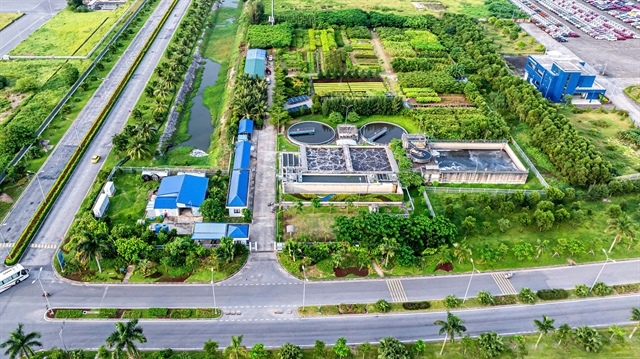
A view of Deep C Haiphong II Industrial Zone in South Đình Vũ Peninsula in northrn port city of Hải Phòng. For Deep C, the cornerstone of its success starts with something simple - location. Photo courtesy of the firm |
From there, the journey moves into smart zone management, powered by technology. In partnership with companies, Deep C is incorporating digital power monitoring systems, predictive maintenance and smart metering - all of which help tenants reduce waste, increase uptime, and operate more efficiently.
“Our tenants don’t just want land anymore,” said Bruno Jaspaert, CEO of Deep C.
“They want a reliable, efficient environment where their operations can thrive sustainably. That’s the future.”
What sets Deep C apart is its evolving vision of what a 'smart industrial zone' actually means.
“A lot of people, when they hear the word smart, they immediately think of high-tech sensors or AI,” he said.
“But smart also means knowing what investors truly need - and helping them with things like talent recruitment, workforce training and integration into the local ecosystem.”
That’s why Deep C works closely with vocational schools, colleges and government bodies to help its tenants find not just the right quantity of workers - but employees of the right calibre.
Nguyễn Thị Thu Hằng, Deputy Director of the Hải Phòng Department of Industry and Trade, said that this approach aligns with the city’s vision of inclusive growth:
“Industrial zones must not exist in isolation. They need to be part of a broader urban strategy that brings opportunities to local communities. Deep C’s efforts in workforce development, education and CSR are examples of how the private sector can play a vital role.”
It’s also why Deep C has embraced the concept of the eco-industrial park, a model officially recognised by the Vietnamese Government through Decree 35 in 2022, with support from the United Nations Industrial Development Organization (UNIDO).
“The word eco can be misleading. It’s not only about being green and clean. It’s about creating an ecosystem where industries can share resources, reuse waste and power themselves more efficiently. That’s the real meaning of eco.”
According to Nguyễn Đức Hiển, Deputy Director of the Central Institute for Economic Management (CIEM), eco-industrial parks are no longer a niche idea but a national strategy.
“Việt Nam’s future competitiveness will depend not only on cost, but on how we use energy, how we manage waste, and how we build partnerships across industries. Deep C is a pioneer that others can learn from,” he said.
One of Deep C’s most ambitious sustainability projects is unfolding in Quảng Ninh, where the company is building a unique inland port system within its industrial park - a move almost unheard of in Việt Nam.
In order to do this, Deep C is dredging several kilometres of river - a massive infrastructure undertaking typically reserved for State authorities.
“When we first proposed it, officials in Hà Nội literally asked, ‘Why would a private company spend its money dredging one of our rivers?' It took us three years of explaining and reasoning before we got the permit.”
The result will be a direct inland waterway connection, reducing logistics costs, cutting emissions and reinforcing the industrial park’s position as a smart logistics hub - both for Việt Nam and the region.
Green hubs
The transformation from traditional industrial zones to smart eco-industrial parks is also about energy transition.
Deep C has committed to generating 50 per cent of its power from renewables by 2030, including investments in on-site wind and solar, biogas and battery storage systems.
“We help our clients reduce power and water consumption. Even a simple thing like installing sensors to detect water leaks can lead to huge savings - both financially and environmentally.”
These efforts are already yielding results. Deep C’s tenants include a growing number of renewable energy firms, EV suppliers and high-tech manufacturers - all seeking a greener, more efficient operating environment.
The Vietnamese Government's support for DEEP C's initiatives is instrumental in the company's success.
Hải Phòng authorities have recognised DEEP C's contributions to the city's development and have encouraged the expansion of its industrial zones. Secretary of the Hải Phòng Party Committee, Lê Tiến Châu, commended DEEP C for attracting quality investors and contributing positively to the city's growth. This collaboration between the private sector and government underscores the importance of public-private partnerships in achieving sustainable industrial development.
Deep C is preparing for its most ambitious project yet, the South Hải Phòng Economic Zone, expected to take shape over the next five to ten years.
This new area will be a blank canvas - allowing planners, investors, and policymakers to apply everything learned so far: smart infrastructure, sustainable energy, efficient zoning and inclusive development.
“We’re starting from a white sheet of paper. And we have the chance to design what could be the most future-proof industrial zone in Việt Nam.”
As industrial zones continue to shape Việt Nam’s economic trajectory, Deep C is also advocating for a more responsible approach to development - one that shares benefits with the local community.
“We understand that as industrial park developers, we take a lot. But we also want to give back. This is about your children, your grandchildren. We want Hải Phòng and Quảng Ninh to remain livable, vibrant and green.”
In an era where investors are not just looking for cheap land, but for long-term partners, Deep C is proving that sustainability, technology and community are not trade-offs - they are essential ingredients for success.
- 09:48 16/04/2025



